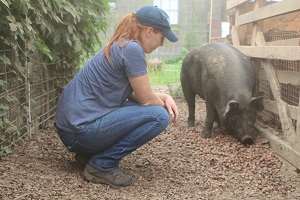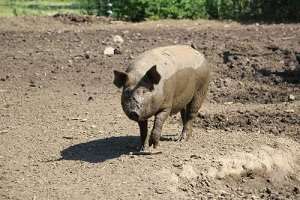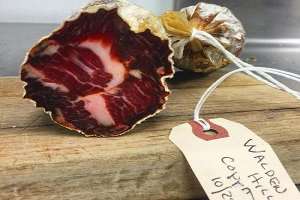
Crouched inside a fenced-in enclosure, Jennifer Milikowsky (MBA/FES ’15), the founder of Walden Hill, holds out a handful of acorns. Two large brown pigs push their snouts in, crunching them up greedily and spitting out the shells.
The startup she launched at Yale, following a 2013 YEI Fellowship, is giving farmers a way to raise pigs without the associated risk and creating a tastier pork thanks to the pigs’ acorn-fed diet.
She makes regular rounds to visit the farms that are raising her pigs, including to a family farm in Westport, Connecticut, where a couple of young farmers have rented space to try pig farming. “We put down a deposit on every pig that’s being raised for us,” Milikowsky says. “We partner with the farmers on the business and guarantee purchase if they maintain our standards.” In addition to acorns, the pigs are allowed some grains and other local seasonal fruits and vegetables—apples and pears in the fall, pumpkins post-Halloween. “Our vision is to get to the point where they are consuming all local products with minimal impact,” she says.
At first, Milikowsky was just looking to find a sustainable way to harvest and sell the acorns which grow so abundantly in Connecticut forests, including the 7,800-acre Yale-Myers Forest. She learned about acorn-fed pork in Spain–jamón Ibérico—considered the world’s finest and wondered if it could be done in the Northeast. “No one knew for sure if it would produce better pork,” she said. “If we raise pigs on acorns in the Northeast, is it all folklore?”
In the end, the chefs decided. Early testers included Michelle Carter at the Butcher Shop in Boston and Jason Sobocinski, owner of Caseus and co-owner of Ordinary and Black Hog in New Haven. “They raved about it,” she says.

In its earliest iterations, Milikowsky had students and community members harvesting acorns for small sums per bag. Now she collects the acorns in large nets and has an official crew collecting. The acorns are sorted, dried in the sun and stored year round. She’s currently working with five farmers raising anywhere from six to 50 pigs. While her initial focus was on the forests, Milikowsky finds herself energized by the opportunity to support small farmers and to increase the amount of food that’s produced by family farms. “The biggest competition for a small farmer is the small farmer down the street,” Milikowsky says. “Neither has access to a large distribution network for pork.”

Walden Hill provides that infrastructure and guaranteed income—buying pork from several farmers to maintain a steady supply for customers, of which the majority, for now, are chefs. You can find Walden Hill pork at Caseus and Heirloom in New Haven, the Whelk in Westport, Coppa in Boston and Toro in New York City as well as at several specialty butcher shops. The business is currently in the process of getting labels so their bacon and sausage can be sold in stores. “From the farmers to the chefs to the butchers, it’s exciting to help support local agriculture and connect all these different pieces,” Milikowsky says.
Source: yale.edu